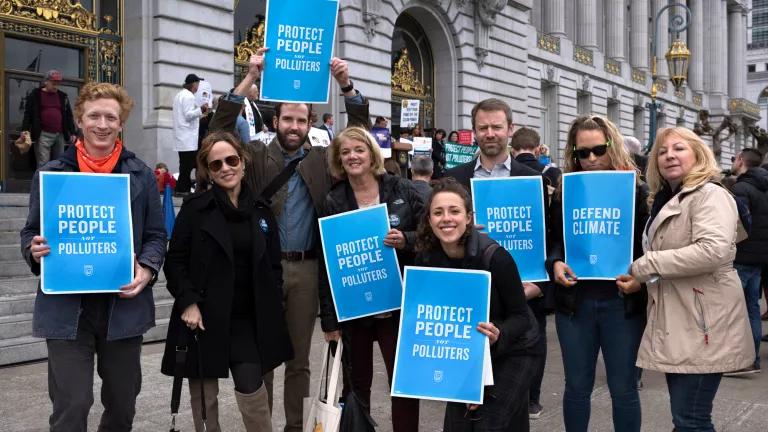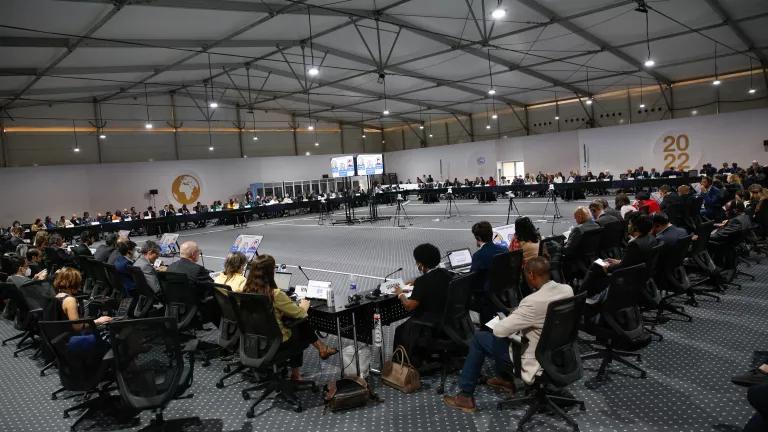The House of Representatives recently released their appropriations bill for funding America’s non-military overseas engagement, including climate change research and diplomacy. The House bill only serves to further the Trump administration’s reckless disregard for safeguarding our common home, and puts the onus on the Senate to stand tall for smart investments in American global climate leadership.
The House appropriations bill for the Department of State, foreign operations, and related programs (SFOPs) explicitly states that no money can be used for contributions to the Green Climate Fund (GCF). However, the GCF is a smart investment based on bipartisan principles that protects Americans from the damages caused by climate change, and creates opportunities for American companies and workers to tap into the growing global clean energy market.
In 2017, more than 362 lives were lost and a record $306 billion was spent in the U.S. alone on weather and climate disasters—including 16 separate $1 billion plus disasters such as Hurricanes Harvey, Maria, and Irma and massive wildfires across the west. These costly climate-fueled disasters are a clear and present danger to American life, property, and prosperity.
The GCF spurs developing countries to reduce their emissions, and helps put the world on a safer trajectory that will minimize the damages faced by American farmers, ranchers, cities, business, children, and people across all walks of life. By not investing in climate solutions now, the House is effectively telling Americans they will need to spend additional and unnecessary sums of hard-earned tax dollars down the road to clean up after the damages of increasingly extreme weather—both at home and abroad. Disaster response efforts around the world show that spending $1 today helps avoid around $7 of investments needed after a disaster hits.
The GCF is also based on bipartisan economic principles, leveraging $6 of financing from the private sector and country budgets for each $1 of public financing from the U.S. That is why President George W. Bush started to ramp-up similar climate investments when he recognized they are in the national interest—both economically and environmentally—and received bipartisan support for his $2 billion commitment to the GCF’s predecessor in 2008.
The GCF also opens new markets for American companies to compete in the global clean energy race and create American jobs. Many companies export their technologies and innovations around the world, including to projects that are enabled by the GCF. By not investing in the GCF, the House is only serving to cut American companies and workers out of the $60 trillion clean energy market.
Furthermore, America’s allies and competitors alike are making smart investments to gain a foothold in the global clean energy economy. China has pledge $3.1 billion to assist developing countries in addressing climate change. And Germany currently provides $2.2 billion per year in international climate support, and will double that amount to $4.5 billion per year by 2020. Unfortunately, the U.S. has only contributed one-third of its pledge to the GCF ($1 billion of a $3 billion pledge) which only serves to undermine our credibility and leadership on the world’s stage, and leave us more at risk at home.
Beyond prohibiting GCF funding, the House bill also bars climate safeguards put in place for America’s international finance under the guise of preventing American job loss. The bill prohibits funding for enforcement of the Overseas Private Investment Corporation’s Environmental and Social Policy Statement provisions relating to coal, and enforcement of the Export-Import (Ex-Im) Bank’s Supplemental Guidelines for High Carbon Intensity Projects that limit support for coal plants overseas. These rules eliminate gains made in previous years that were designed to limit the negative climate impacts of projects funded by OPIC and Ex-Im overseas, by allowing highly polluting projects to be eligible for U.S. government support.
The companion Senate SFOPs appropriations bill being marked-up this week must stand strong in its support of smart international climate investments. This includes the GCF and international finance climate safeguards, as well as America’s investment in the United Nations Framework Convention on Climate Change (UNFCCC) and the Intergovernmental Panel on Climate Change (IPCC).
Contributing to the UNFCCC is vital to uphold U.S. influence in international climate change negotiations that keep America’s “seat at the table” in order to advance its interests. And investing in the IPCC facilitates U.S. engagement in climate change research to proactively monitor and manage the risks of extreme weather events to American lives and property. Funding for both the UNFCCC and IPCC is one of the few bright spots explicitly endorsed in the administration’s budget proposal for fiscal year 2019.
With the House and the Trump administration running at top speed away from America’s global climate leadership, it’s up to the Senate to strongly affirm the value of international climate investments to ensure sustained American prosperity in the face of escalating climate risks.




